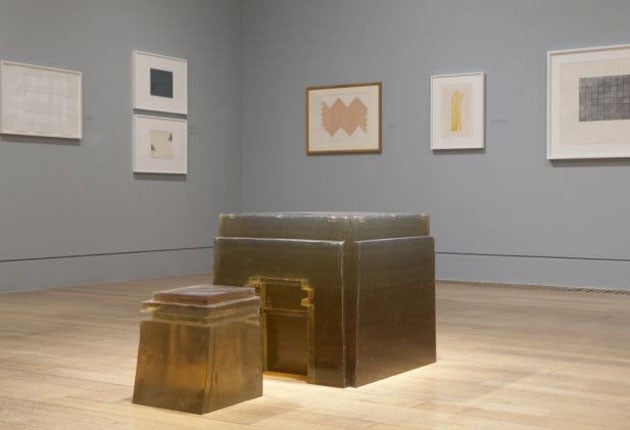Rachel Whiteread: Drawings, Tate Britain, London
A day in the life of a door knob

Your support helps us to tell the story
From reproductive rights to climate change to Big Tech, The Independent is on the ground when the story is developing. Whether it's investigating the financials of Elon Musk's pro-Trump PAC or producing our latest documentary, 'The A Word', which shines a light on the American women fighting for reproductive rights, we know how important it is to parse out the facts from the messaging.
At such a critical moment in US history, we need reporters on the ground. Your donation allows us to keep sending journalists to speak to both sides of the story.
The Independent is trusted by Americans across the entire political spectrum. And unlike many other quality news outlets, we choose not to lock Americans out of our reporting and analysis with paywalls. We believe quality journalism should be available to everyone, paid for by those who can afford it.
Your support makes all the difference.As a sculptor, she is best known for casts of what are often called "negative spaces". What are these? They are the spaces that objects – tables, houses, etc – either displace or disguise by their physical presence. Have you ever thought about the space beneath the very table – that roughly cube-shaped (or circular perhaps) weight of air – at which you are sitting? Is not the idea of that shape almost as interesting as the shape of the table itself? Wouldn't you like to see it rendered in three dimensions? That is Rachel Whiteread's job.
This first-ever museum exhibition of her drawings shows Whiteread doodling (her word) on paper, using pencil, gouache, ink, correcting fluid (to build texture). She calls these drawings her working diary, but they are in no way personal or confessional. They don't throw back at us any kind of image of the sculptor. They feel coolly constructed, painstakingly analytical. They remind us of work by the minimalists – paintings by Frank Stella from the 1960s, or stacked units by Donald Judd. They are cerebrally set apart from us. We don't readily engage with them emotionally. And yet, in an odd sort of way we do. One of the reasons for this is that the objects of Whiteread's world, the things with which she doodles so painstakingly, are so familiar to us.
The little sub-themes of the show – they are written up on the walls as we pass from gallery to gallery – are words that we have been reading, and objects that we have been attending to all our lives: tables, chairs, beds, mattresses, floors, doors, windows, switches, baths, slabs. Nothing abstract about any of that. She draws particular examples of these objects, often on graph paper. They could not be more familiar because they are wholly typical examples of their kind – the knob is a perfectly round knob, the door is as customary a door as you could ever wish to enter by. And yet they do look singular, and it is in part to do with the fact that some of these objects are set against that graph paper. The green door seems to rise up off the page like a kind of ghostly prototype of itself. Floors are different; it is the rhythms of bits of parquet flooring that interest her, their shapeliness as they interlock. These simple examples of shapeliness, the way they can be ordered and then disordered, possess a pleasing kind of mystery.
But how much can we feel for much of this work? We feel most for a detail on the Holocaust Memorial that she created in Vienna in 2000; there's a model of it here. It's severe, impenetrable. On its roof there is a strange spiral. If you look on the wall near the model you will see that this spiral is a trace of the ceiling rosette inside the building – an interior no one ever sees. She has painted that rosette, from the inside, three times. One tiny painting is a very dark brown, with a flex and a light bulb depending. The trace of a human presence. Light amid the acknowledgment of terrible barbarities.
To 16 January 2011 ( tate.org.uk)
Join our commenting forum
Join thought-provoking conversations, follow other Independent readers and see their replies
Comments